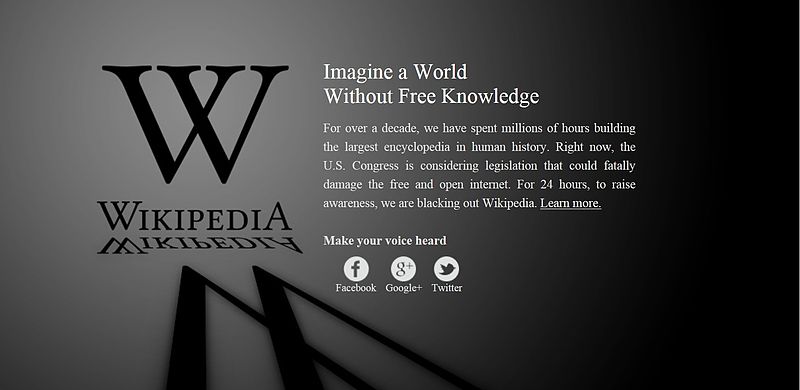
It is inconsistent to support Wikipedia’s blackout while protesting the Supreme Court’s decision in Citizens United.
Why have many progressives strongly supported internet companies’ protests of two copyright-protection bills while condemning other companies’ efforts to exercise their speech in the political process?
I believe the reason is a popular conflation of the medium of the internet and the message of progressivism. Because internet companies are considered innovative and are often run by Silicon Valley entrepreneurs, many people mistakenly treat them as if they are not corporate actors just like any other business enterprise.
MoveOn.org, a progressive political action group, has a petition on its website protesting the Supreme Court’s Citizens United decision to protect corporate free speech – but it is also supporting the recent Wikipedia blackout and other internet companies’ political action against bills, the proposed Protect Intellectual Property Act (PIPA) and the Stop Online Piracy Act (SOPA), that would limit their corporate free speech. MoveOn and other progressives fail to see that if they succeeded in unraveling the Supreme Court’s decision in Citizens United, the kind of speech exercised by internet companies this week would also be potentially subject to government regulation.
Internet companies have been taking political action for the same reason that virtually all companies protest government regulation: to avoid increasing their costs. PIPA and SOPA would effectively force companies like Google to monitor all links placed on their websites, thereby increasing their costs – just as other regulations force pharmaceutical companies, automobile manufacturers, and steel mills to increase their costs.
But progressives appear too willing to hold corporate speech by internet companies to a double standard. Google, of course, has famously contributed to this confusion with its mantra of “do no evil.” Upon going public in 2004, Google announced it would not become a conventional company but would continue focusing on innovation and “do[ing] things that we believe have a positive impact on the world, even if the near term financial returns are not obvious.”
Regardless of the initial ideals of some entrepreneurs who started internet companies in the past, the internet is now simply another medium in which to make money, just like television or radio.
There are certainly problems with the details of PIPA and SOPA, but those problems should not obscure the importance of consistency in law and public policy. If it is necessary to regulate corporate speech, then speech by internet companies should certainly not be exempt from criticism. Alternatively, if it is permissible for companies like Google to use their economic power to prevent the enactment of PIPA and SOPA, then it is hard to claim that the Supreme Court had things entirely wrong in its decision in Citizens United.




